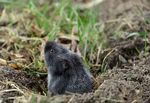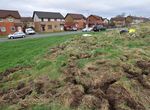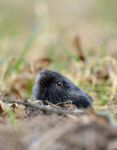SPRINGWATCH - Anna Levin Writing
←
→
Page content transcription
If your browser does not render page correctly, please read the page content below
See Glasgow’s
water voles on
SPRINGWATCH
this June.
Photos by Laurie Campbell
Inner-city Glasgow is the
unlikely home of a group of
all-black water voles that
behave more like moles.
Anna Levin goes in search
of an urban enigma.
Black ‘Ratty’ appears out
of a burrow in a park in
Glasgow. Non-aquatic water
voles were discovered in the
Greater Easterhouse area
of the Scottish city in 2008,
occupying urban grasslands
in residential areas and
along road verges.Right: this site in
WATER VOLES
Glasgow has been
earmarked
for development.
Ecologists have
been called in to
move the voles
to a new site.
Below right: in
the suburb of
Garthamlock,
north of the River
Clyde, water vole
holes have been
exposed. Inset
left: markers are
used to indicate
where a burrow is
located.
T
he last time I went looking for water voles
Above: Glasgow’s
‘fossorial’ voles
settle, binoculars poised, beside a gentle slope. Within a FUR COLOUR: IN THE BLACK
with wildlife photographer Laurie Campbell, have glossy black few minutes a black face appears at a burrow entrance. My
Scotland’s water voles are thought to have different
we were high on a moor in Scotland’s or brown fur, first water vole sighting comes with a start of familiarity,
ancestors from the mostly chestnut-brown English and
Monadhliath Mountains. The silence was rounded ears, a nostalgia even – why, it’s Ratty! Then another one, chocolate-
blunt muzzle and Welsh populations. Water voles colonised the UK during
so intense I could hear the sound of my pen brown this time, scuttles out – quivering, dashing around
small eyes like the Ice Age, and genetic studies have shown that two
as I scribbled notes. Crouching beside a their ‘riparian’ like a small guinea pig in a hurry – and disappears again.
distinct populations took different routes. Scotland’s
ditch, Laurie pointed out the neat ‘lawns’ at (watery water As I tune in, I see more and more burrows, and water
darker lineage are believed to have come across a land
the water’s edge where the grass had been nibbled short by vole) cousins. voles popping up like jack-in-the-boxes. Right here, in an
Below: the bridge from the Iberian Peninsula, while England and
water voles. I heard a sudden, soft ‘plop’, saw a twitch in the otherwise normal inner-city park, against a backdrop of grey
mole-like rodents Wales were colonised from Southeast Europe. Most of
tussocky grass… but nothing more. pop up from a
tower blocks, with kids cycling, mothers pushing buggies
Glasgow’s water voles are black, though some are brown.
Today we’re on the edge of the M8 motorway, which complex system and dog walkers strolling by. It feels incongruous, verging
slices through the centre of Glasgow, relentless traffic of burrows. on surreal. For a start, there’s no water! Surely ‘Ratty’ should
thundering by. We’re just below a retail park and along be messing about on a riverbank? Every field guide worth
the steep earth slope, among discarded coffee-cup lids its salt tells us to look for water voles beside slow-moving
and sandwich wrappers, are small, round holes: water rivers, canals, streams or marshy pools. Robyn tells us that when Glasgow’s water voles were first
vole burrows. We’re here with zoologist Robyn Stewart, discovered in grassland in 2008 – one accidentally caught
researcher for the Glasgow Water Vole Project, who is ADAPTABLE RODENTS in a trap set for rats – the initial response was a blanket ban
giving us a tour of her unlikely beat. In the UK Arvicola amphibius is normally ‘riparian’ on cutting of long grass. But in fact, properly managing the
– living beside water – but across the species’ broad habitat of fossorial water voles means actively maintaining
LOOKING OUT OF PLACE range from Spain to Siberia many of its populations open grassy areas. Leave the grassland too long and it will
It just so happens that the East End of Glasgow, including are ‘fossorial’ – non-aquatic, living in grassland and become scrub and then woodland.
a few kilometres of motorway corridor, city parks and burrowing like moles. Sometimes these fossorial water The team are currently trialling a new machine with
Xxxxxx xxxxxxx xxxxx xxxxxx xxxxx xxxx xxxxxxxx
housing estates, hosts the highest density of water voles occur in large numbers and are considered a pest exceptionally low ground pressure to cut the grass safely,
voles anywhere in the UK. You could hardly of farmland and gardens. So our ‘watery water voles’ taking small plots in rotation and leaving long grass
conceive of a less promising place to find a represent just one lifestyle option for these adaptable nearby as a refuge. To learn more about how disturbance
species that’s not only one of our fastest rodents. What is unusual in Glasgow is the voles’ high
declining mammals, but also popularly population density and their proximity to urban life.
associated with idyllic, languid backwaters.
We continue to a nearby park, and
Robyn leads us closer, carefully sticking to a path around
the edge of the slope, which is honeycombed with burrows.
“IN AN OTHERWISE NORMAL INNER-CITY PARK,
It reminds me of walking near puffin colonies on the Isle of I SEE MORE AND MORE BURROWS, AND WATER
May or Farne Islands, where straying from the path could
risk collapsing a burrow underfoot. VOLES POPPING UP LIKE JACK-IN-THE-BOXES.”
24 June 2018 June 2018 BBC Wildlife 25WATER VOLES
XXXXXXXXX XXXXXXXXXXX
Xxxxxxxx xxxxxx
Xxxxxx xxxxx xxxxx xxxxx
xxxxx xxxxx xxxxx xxx xxxx
xxxxx xxxxx xxxxx xxxxx
xxxxx xxxxx xxx xxxx xxxxx
xxxxx xxxxx xxxxx xxxxx Xxxxxx xxxxx xxxxx xxxxx
xxxxx xxx xxxxx xxxxx xxxxx xxx xxxx
xxxxx xxxxx xxxxx xxxxx
xxxxx xxxxx xxx xxxx xxxxx
xxxxx xxxxx xxxxx xxxxx
xxxxx xxx
Xxxxxx xxxxx xxxxx xxxxx
xxxxx xxxxx xxxxx xxx xxxx
xxxxx xxxxx xxxxx xxxxx
xxxxx xxxxx xxx xxxx xxxxx
xxxxx xxxxx xxxxx xxxxx
Above: Glasgow
affects the water voles, individually and as a colony, tiny has probably xxxxx xxx
radio transmitter collars will be fitted to monitor their been home to
behaviour and daily range. water voles for
During the summer breeding season, Robyn continues, hundreds of
years but reliable
the females use latrines to demarcate their territory. They records have
agreement about an intuition you develop, over time, that
scratch at scent glands on their flanks and then drum down only been kept a certain patch of grass just “feels water vole-y”. Laurie
on droppings with their hind legs to leave a signature scent in more recent remembers seeing water voles – or, more often, signs
for passing males. Females patrol their territory regularly, times. Right: of their presence – when he was a child in the Scottish
Robyn Stewart
and the latrines can get quite large – a 20cm-long trail of Borders exploring disused limekiln ponds in search of
is... xxxxx xxxxxx
brown sludge, often seen under a grassy tussock. Robyn xxxx xxxx xxxx frogspawn, great-crested newts and dragonflies. The
has seen latrines as early as April, but not in 2018. Winter xxxxx xxxx xxxx ponds were filled in when a new road was built, the rich
still had the year in its teeth and was not letting go. xxxx xxx Above wetland habitat was lost, and the water voles disappeared.
right: cranhill Laurie’s experience in Berwickshire is a microcosm of
xxxxx xxxxx
SNOWED IN xxxxxx xxxx xxxx
the wider UK story. A survey in the late 1990s showed
This March and April the snow kept on coming, and that almost 90 per cent of the water vole population
postponed our visit a few times, but apparently it disappeared in 1989–1998, mostly due to habitat loss,
doesn’t trouble the water voles. Snow insulates their exacerbated by predation by American mink.
“wonderfully complex system of burrows”, and they’re
Xxxxxx xxxxxxx xxxxx xxxxxx xxxxx xxxx xxxxxxxx
snug underground with everything they need – indoor GREENS AND GRASSLAND
toilets, overwinter food stores and even spare bedding. Robyn wonders if we exaggerate the difference between
The chill drives us indoors for a lunch break, where riparian and fossorial lifestyles in water voles. After all,
Robyn and Laurie swap water vole stories, nodding in these are tenacious and highly adaptable small mammals Xxxxxx xxxxx xxxxx xxxxx Xxxxxx xxxxx xxxxx xxxxx
that feed on a wide range of grasses and other vegetation xxxxx xxxxx xxxxx xxx xxxx xxxxx xxxxx xxxxx xxx xxxx
SNOW POSTPONED OUR VISIT BUT IT DOESN’T (studies have identified 227 plant species in their diet).
While they naturally are drawn to the rich vegetation
xxxxx xxxxx xxxxx xxxxx
xxxxx xxxxx xxx xxxx xxxxx
xxxxx xxxxx xxxxx xxxxx
xxxxx xxxxx xxx xxxx xxxxx
TROUBLE THE VOLES. THEY HAVE EVERYTHING around rivers, streams and pools, if there is no break
in the habitat, they’ll happily spread into surrounding
xxxxx xxxxx xxxxx xxxxx
xxxxx xxx
xxxxx xxxxx xxxxx xxxxx
xxxxx xxx
THEY NEED UNDERGROUND TO STAY SNUG. grasslands. All they need are good food and soft soil.
26 BBC Wildlife June 2018 BBC Wildlife 27XXXXXXXX
FOSSORIAL WATER VOLE FIELD SIGNS
DROPPINGS SOIL MOUND
The definitive field sign for all water Also known as a tumulus, this
voles, both fossorial and aquatic. flattened mound resembles a molehill
Droppings are 8–12mm long, tubular but is not as tall or conical. Found in
with blunt ends, and green when open grassy areas, often alongside a
fresh but dark brown when dry. burrow entrance, usually in clusters.
They can be found all year. Latrines Mostly seen in spring and autumn
are conspicuous piles of flattened during breeding and dispersal.
droppings, usually with fresh ones
on top, and are found only in the BURROW ENTRANCE
breeding season; they are associated Wider than it is tall, 4–8cm in diameter,
with scent marking. and well-defined when in use. A fan-
shaped mound of soil outside indicates
the burrow is freshly dug. Found on
FEEDING STATION both slopes and flat ground, usually
Another field sign common to all water voles. in open tussocky grassland.
The piles of gathered plant material may
include grasses, sedges, rushes, bark,
seeds, and berries. Material
may be of varying lengths,
but is always cut
at a 45° angle. In
fossorial water
voles, piles are
found at the
base of a grass
tussock and
well covered.
What has probably happened in Britain is that the land the water voles – people used to think they were “big,
is so heavily managed, we’ve largely restricted water voles black rats”, he says. But word’s got around that they
to the edge of watercourses. Fossorial water voles cling are something special: a rare population of a nationally
on in Glasgow, where they may have been for hundreds endangered species. He’s seen one pop up in his garden,
of years, and there are also some on a few islands in the he adds with a sense of pride.
Inner Hebrides. Could there be others? It’s likely that Robyn says there’s mostly been a very positive reception
more fossorial populations exist elsewhere, unnoticed, to the Glasgow Water Vole Project. It involves a challenging
because we only go looking for water voles near water. mix of science and diplomacy: devising and managing
research projects, and liaising with housing developers,
SPECIAL NEIGHBOURS residents, council officials and local schoolchildren – some
Glasgow has ‘watery water voles’ too, in nearby wetlands, of whom have water voles in their school playgrounds.
though we are not searching for those today. Our last There’s a real commitment from all stakeholders
port of call is a patch of green beside a housing estate, to “get it right” Robyn says, for both water voles and
its slopes dotted with vole burrows and crowned with people. “It’s all part of a growing acknowledgement
pigeon lofts, or ‘doocots’. The site has been earmarked that wildlife – and the wild – is not just in the far-flung
for development and so ecologists have been brought reaches of the Highlands, but right
Xxxxxx xxxxx xxxxx xxxxx xxxx
in to move the resident voles to a new site. Water voles + GET INVOLVED here in Glasgow.”
are a protected species and it is an offence to damage or O Spring survey work for the National
disturb their habitat, but the team has a licence and know Water Vole Monitoring Programme ANNA LEVIN is an author
what they are doing. They carefully remove the turf, is coming to an end, but you can still and former section editor
submit one-off sightings at
revealing the extensive network of tunnels just beneath. www.ptes.org/get-involved/surveys.
of BBC Wildlife;
A nearby householder stops to chat. He knows about www.annalevinwriting.co.uk.
28 BBC Wildlife June 2018You can also read



























































